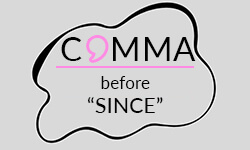
Commas serve multiple purposes in academic writing. They’re key compounds to clarify meaning, indicate pauses, separate items in a list, etc. In particular, there are specific rules when setting commas before “since.” Properly placing commas ensures that the intended meaning of a sentence is conveyed accurately and helps avoid ambiguity. This article provides an in-depth insight regarding comma rules before the word “since.”
When to place a comma before “since”
In essence, when the word “since” introduces a reason or cause, a comma is placed. In other words, when “since” takes on the meaning of “because” or “for that reason,” and stands in the initial position of a clause or sentence, it is urged to set a comma. This clearly separates the reason or causal clause from the main clause.
Comma
Introducing a causal clause
No comma
Indicating a time frame or point
Depending on the context and Style Guide, comma rules may vary. Occurrences of sentences with complex structures may also have special or different rules in terms of placing a comma. Therefore, it is integral to pay attention to the clarity and readability of a sentence to determine whether to place a comma or not.
Comma before “since”
When “since” acts as a conjunction and initiates a cause or reason in a clause, it is necessary to proceed with placing a comma before “since.”
Introducing a causal clause
When “since” introduces a causal clause, it is usually preceded with a comma to clarify that the clause reflects on a previous statement, providing additional information for a reason or cause. This helps the reader determine whether it is a causal or temporal “since.”
No comma before “since”
The general rule is that there is no use for placing a comma before “since” when it is used in a temporal sense.
Indicating a time frame or point
When “since” functions as a preposition and is used to indicate a certain time frame or point, it is typically not preceded by a comma. In other words, when “since” in a clause or sentence refers to time, the comma before “since” should be omitted.
Test yourself!
Practice sheet
Determine the correct comma placements before “since” in the following 10 sentences. Compare with the answers in the following tab, and make sure you gained a proper understanding of the comma rules before the word “since.”
- She hasn’t visited that place since she moved away last year.
- They decided to wear boots since the forecast predicted rain.
- We haven’t seen each other since we graduated from university.
- He didn’t want to join the trip since he is afraid of flying.
- It’s been a tradition in our community since I was little.
- The meeting has been postponed since many got ill.
- The main road has been closed since the storm last week.
- I always bring a hat since it often snows in the afternoons.
- She has been feeling under the weather since catching a cold.
- They have been inseparable since they met in kindergarten.
- She hasn’t visited that place since she moved away last year. (No comma)
- They decided to wear boots, since the forecast predicted rain. (Comma)
- We haven’t seen each other since we graduated from university. (No comma)
- He didn’t want to join the trip, since he is afraid of flying. (Comma)
- It’s been a tradition in our community since I was little. (No comma)
- The meeting has been postponed, since many got ill. (Comma)
- The main road has been closed since the storm last week. (No comma)
- I always bring a hat, since it often snows in the afternoons. (Comma)
- She has been feeling under the weather since catching a cold. (No comma)
- They have been inseparable since they met in kindergarten. (No comma)
- ✓ 3D live preview of your individual configuration
- ✓ Free express delivery for every single purchase
- ✓ Top-notch bindings with customised embossing

FAQs
You place a comma before “since,” when “since” introduces a causal clause implying reason or cause. A comma is omitted before “since,” when the following clause refers to time.
- She cancelled the trip, since she is ill. (Reason)
- He has lived here since last December. (Time)
When “since” is in the initial position of a sentence, a comma is placed after the “since” clause.
- Since the wedding was called off, she took the honeymoon trip with her friend.
“Since” in a sentence functions as a preposition with a time or noun phrase.
- It was their first performance since June 1993. (Time)
- They have been happily married for 10 years, since the age of 18. (Noun phrase)
“Since” can also function as a conjunction, introducing subordinate clauses.
- It has been so long since we saw each other. (Clause)
The preposition “for” is typically used in this construct: “for” + a full stop of time
- The team has been waiting for several hours.
On the other hand, “since” follows this construct: “since” + beginning of a full stop of time
- The team has been waiting since 7 o’clock.
When “since” acts as a preposition in a sentence, implying a particular time or date in the past, the present perfect and past perfect tenses are normally used.
- The construction has been going on since April and there is no sign of it ending.
